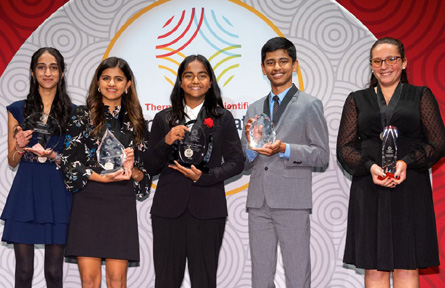SAN JOSE, CA (TIP): Shanya Gill, a 12-year-old Indian American student from San Jose, California won the top $25,000 Thermo Fisher Scientific ASCEND (Aspiring Scientists Cultivating Exciting New Discoveries) Award, at the inaugural Thermo Fisher Scientific Junior Innovators Challenge.
Three other Indian American students also won top prizes in the nation’s premier middle school science, technology, engineering and math (STEM) competition run by Thermo Fisher Scientific and Society for Science.
In addition to the top prizes, six Indian American students were among first- and second-place winners in each of the STEM categories of Science, Technology, Engineering and Math, as well as the competition’s Team Award.
Shanya was inspired to create a fire-detection system after a fire destroyed a restaurant behind her house in the summer of 2022, according to a Society press.
She connected an affordable thermal camera to a compact computer and then programmed the system to differentiate between people–which were identified as warm objects moving horizontally–and heat sources, such as an active gas burner, which were identified as hot objects that remained stationary.
Shanya then programmed the system to send a text message when it detected a heat source but no human presence for a continuous 10-minute period. Shanya’s system accurately detected human presence 98% of the time and heat sources 97% of the time.
The Thermo Fisher JIC, a program of Society for Science, reaches 65,000 middle schoolers nationwide and inspires them to follow their personal STEM passions to exciting college and career paths.
The 30 finalists are counted among the nation’s brightest students, with several, including Shanya, collectively accepting more than $100,000 at an award ceremony at The Kennedy Center in Washington, DC on Nov 1.
Each of the 30 finalists participated in team challenges in addition to being judged on their science research projects. The challenges leveraged project-based learning and tested their critical thinking, communication, creativity and collaboration skills in each of the STEM areas.
During the team challenges, the finalists designed devices to study the Chesapeake Bay’s oyster reef ecosystem and investigated the spread of a “zombie pathogen” to find solutions and identify mitigation or eradication strategies.
The finalists also employed block coding and construction skills to create an interactive minigolf hole.
“The top winners of the Thermo Fisher Scientific Junior Innovators Challenge have exhibited boundless curiosity,” said Maya Ajmera, President and CEO of Society for Science and Executive Publisher of Science News Media Group. “Their remarkable research not only reflects their talent but also paves the way for an exciting new future.”
Shanya Gill, 12, San Jose, Calif.; won the $25,000 ASCEND Award for her project designing a fire detection system as well as the leadership, collaboration and critical thinking skills she demonstrated through the course of her research project and Finals Week challenges.
Keshvee Sekhda, 14, Sugar Hill, Ga.; won the $10,000 Broadcom Coding with CommitmentTM Award for combining coding with STEM knowledge to create a solution that improves one’s community and aligns with the 17 Sustainable Development Goals of the United Nations.
Keshvee and her teammate Nyambura Sallinen developed a smartphone app called IdentiCan to identify breast, lung and skin cancer. It uses photos or health scans, sound clips and personal health information to predict diagnoses.
Maya Gandhi, 14, Anaheim, Calif.; won the $10,000 DoD STEM Talent Award for demonstrating excellence in science, technology, engineering or math, along with the leadership and technical skills necessary to excel in the 21st Century STEM workforce and build a better community for tomorrow.
Maya explored different substances to boost energy output of plant microbial fuel cells, which generate electricity using living plants and microbes.
Adyant Bhavsar, 13, San Jose, California; won the $10,000 Lemelson Award for Invention, awarded by The Lemelson Foundation to a young inventor creating promising product-based solutions to real-world problems.
Adyant created a low-cost, eco-friendly version of a triboelectric nanogenerator. This device generates electricity from the mechanical energy of two touching objects when they separate.
First- and second-place winners of STEM Awards, including six Indian American students, demonstrated acumen and promise in science, technology, engineering and math, according to the release.
First-place winners were awarded $3,500 and second-place winners received $2,500 to support their choice of a STEM summer camp experience in the US. All STEM Award winners received an iPad.
Technology Award:
First place: Advait Badrish, HeartNN: A High-Accuracy Neural Network for Cardiac Auscultation
Engineering Award:
First place: Krishna Bhatt, A Novel Wearable for Active Prevention of Falls Through GRU-Based Gyroscopic Inference and Center of Mass Manipulation
Mathematics Award:
Second place: Amritha Praveen, Improving Mental Health Using Artificial Intelligence-Powered Music Therapy
Team Award, sponsored by TIES: Each member of the Finals Week challenge team that best demonstrates their ability to work together and solve problems through shared decision-making, communication and scientific and engineering collaboration received a $200 science supply company gift card to support their interests in STEM.
Silver Team: Colin Beckner, Adyant Bhavsar, Shanya Gill, Akshadha Mehta, Venice Parnell
Thermo Fisher Scientific Leadership Award went to Maya Gandhi for Optimizing Plant Microbial Fuel Cell Energy Output: The Effect of Anodic Substance and Configuration.
The award recognizes one finalist elected by their peers to speak on behalf of their Thermo Fisher JIC class at the Awards Ceremony. The Class Speaker demonstrates the collegiality and spirited leadership that has earned the collective esteem of the class and united them around common goals.
Indian American Shanya Gill wins $25,000 top award in Junior Innovators Challenge

Shanya Gill with other “Junior Innovators Challenge” winners -Colin Beckner, Adyant Bhavsar, , Akshadha Mehta, Venice Parnell.